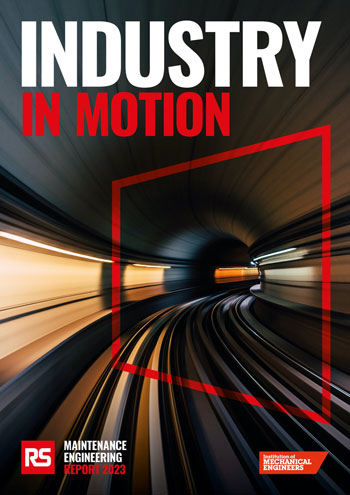
Attracting talent, inflation and supply chain disruption emerge as the top three challenges facing maintenance engineers according to the ‘Industry in Motion’ Maintenance Engineering report from RS and the Institution of Mechanical Engineers.
The report is based on findings from a survey that aimed to ‘take the pulse’ of the profession, conducted among more than 1,200 IMechE members, with almost 700 responses from engineers in sectors including manufacturing, working in job roles like engineering manager.
The report covers five key areas: monitoring maintenance engineering, skills, the true cost of breakdowns, raising performance through stakeholder collaboration, and harnessing technology to improve efficiency.
The top three challenges respondents cited as expecting to affect them over the next 12 months were attracting talent (47%), inflation and higher costs (47 per cent), and supply chain disruption (40%). Ageing assets and mechanical failures are identified as the biggest drivers of unscheduled downtime. The report revealed that nearly 20 hours are spent each week on unscheduled maintenance, compared with around 18 hours spent each week on scheduled maintenance. The average hourly cost of downtime is £5,121.81 (ranges from c. £1,700 to £7.5k depending on size of business)
It also found that the average weekly cost of unscheduled downtime is £100,371. The survey concludes that organisations need to get a grip on maintenance spend, as nearly a third of respondents do not know what proportion of their annual operating budget is spent on maintenance; 30% say approximately five to 10 per cent is spent.
Survey respondents cited the highest priority plans for decreasing unscheduled downtime as upgrading equipment (48%) and widening monitoring capabilities (46%). Planned maintenance has emerged as the number one company strategy in place, deemed the highest priority by 53% of respondents.
Emma Botfield, managing director for RS in the UK and Ireland, said: “The challenges facing businesses today mean that maintenance engineers are even more critical to manufacturing success, while under pressure to do more with their existing resources which often include ageing assets. “They’re also firefighting because of the geopolitical environment and its effect on supply chains.”
The report found that more than 60% of respondents are outsourcing some form of maintenance requirement, with a gap in skills being the top two reasons.
On digital transformation, only 16% of respondents said they use Industrial Internet of Things (IIoT) and fewer than one in five respondents said their company is planning a digital transformation in the next 12 months. Condition monitoring, which uses IIoT, is being employed, according to more than half of the respondents. The top two technologies are vibration measurement – used by 44% of respondents – and current monitoring, used by 43%. The main benefits cited from using these technologies are understanding asset health and better prediction of failures.

